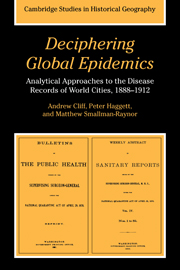Crossref Citations
This Book has been
cited by the following publications. This list is generated based on data provided by Crossref.
Smallman‐Raynor, Matthew
and
Cliff, Andrew D
1999.
The Spatial Dynamics of Epidemic Diseases in War and Peace: Cuba and the Insurrection against Spain, 1895–98.
Transactions of the Institute of British Geographers,
Vol. 24,
Issue. 3,
p.
331.
THRIFT, NIGEL
and
WALLING, DES
2000.
Geography in the United Kingdom 1996–2000.
The Geographical Journal,
Vol. 166,
Issue. 2,
p.
96.
Ogden, Philip E.
2000.
Weaving demography into society, economy and culture: progress and prospect in population geography.
Progress in Human Geography,
Vol. 24,
Issue. 4,
p.
627.
REHER, DAVID S.
and
SANZ-GIMENO, ALBERTO
2000.
Mortality and economic development over the course of modernization: An analysis of short-run fluctuations in Spain, 1850-1990.
Population Studies,
Vol. 54,
Issue. 2,
p.
135.
Szreter, Simon
and
Hardy, Anne
2001.
The Cambridge Urban History of Britain.
p.
629.
Gatrell, A. C.
2001.
Guest editorial: Geographies of primary health-care: perspective and introduction.
Health & Social Care in the Community,
Vol. 9,
Issue. 5,
p.
263.
Sattenspiel, Lisa
2002.
Human Biologists in the Archives.
p.
234.
Winegarden, C.R.
and
Murray, John E.
2004.
Effects of early health-insurance programs on European mortality and fertility trends.
Social Science & Medicine,
Vol. 58,
Issue. 10,
p.
1825.
Trevelyan, Barry
Smallman-Raynor, Matthew
and
Cliff, Andrew D.
2005.
The Spatial Dynamics of Poliomyelitis in the United States: From Epidemic Emergence to Vaccine-Induced Retreat, 1910–1971.
Annals of the Association of American Geographers,
Vol. 95,
Issue. 2,
p.
269.
Grassly, Nicholas C.
Fraser, Christophe
and
Garnett, Geoffrey P.
2005.
Host immunity and synchronized epidemics of syphilis across the United States.
Nature,
Vol. 433,
Issue. 7024,
p.
417.
Hinman, Sarah E
Blackburn, Jason K
and
Curtis, Andrew
2006.
Spatial and temporal structure of typhoid outbreaks in Washington, D.C., 1906–1909: evaluating local clustering with the G
i
* statistic.
International Journal of Health Geographics,
Vol. 5,
Issue. 1,
Baehr, Peter
2006.
Susan Sontag, battle language and the Hong Kong SARS outbreak of 2003.
Economy and Society,
Vol. 35,
Issue. 1,
p.
42.
Sumi, Ayako
Kamo, Ken‐ichi
Ohtomo, Norio
and
Kobayashi, Nobumichi
2007.
Study of the Effect of Vaccination on Periodic Structures of Measles Epidemics in Japan.
Microbiology and Immunology,
Vol. 51,
Issue. 9,
p.
805.
Curtis, Andrew
Mills, Jacqueline W.
and
Blackburn, Jason K.
2007.
A Spatial Variant of the Basic Reproduction Number for the New Orleans Yellow Fever Epidemic of 1878.
The Professional Geographer,
Vol. 59,
Issue. 4,
p.
492.
Garnett, Geoffrey P.
and
Lewis, James J. C.
2007.
HIV, Resurgent Infections and Population Change in Africa.
p.
27.
Birn, Anne-Emanuelle
2009.
The stages of international (global) health: Histories of success or successes of history?.
Global Public Health,
Vol. 4,
Issue. 1,
p.
50.
Cliff, Andrew D.
and
Ord, J. Keith
2009.
What Were We Thinking?.
Geographical Analysis,
Vol. 41,
Issue. 4,
p.
351.
Golding, Jean
Jones, Richard
Bruné, Marie‐Noël
and
Pronczuk, Jenny
2009.
Why carry out a longitudinal birth survey?.
Paediatric and Perinatal Epidemiology,
Vol. 23,
Issue. s1,
p.
1.
SUMI, AYAKO
HEMILÄ, HARRI
MISE, KEIJI
and
KOBAYASHI, NOBUMICHI
2009.
Predicting the incidence of human campylobacteriosis in Finland with time series analysis.
APMIS,
Vol. 117,
Issue. 8,
p.
614.
Acuna-Soto, Rodolfo
2009.
Mathematical and Statistical Estimation Approaches in Epidemiology.
p.
189.





